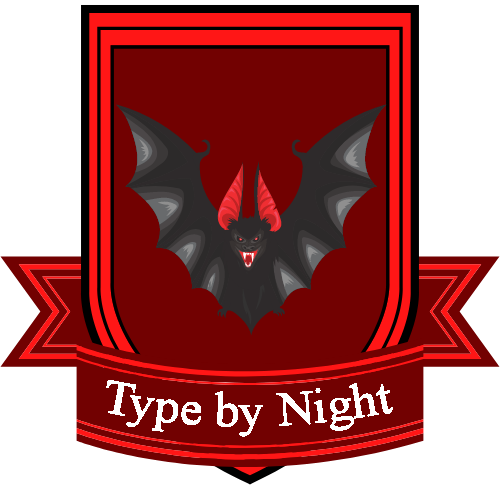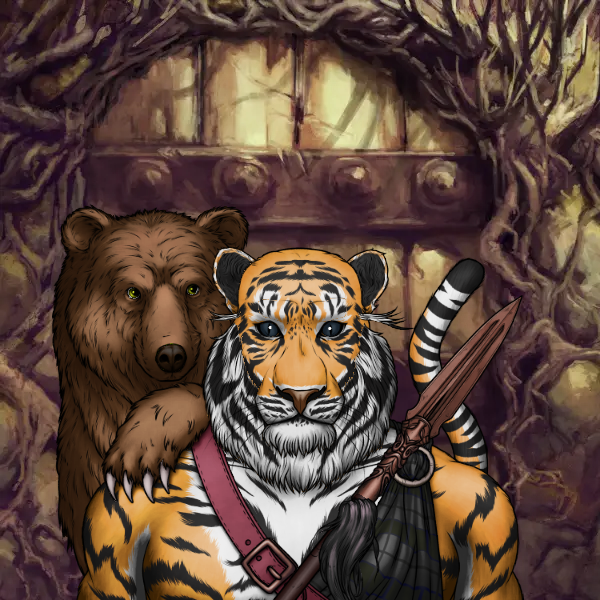Werebear
Werebears are Literomancers and Werebeasts who are totemically connected to the Bear Totem. Most werebears are able to shift into a bestial and/or half-bestial form at will. Partial transformations are also possible. Some will also shift if certain personal triggers — such as a particular moon phase or becoming angry — occur.
While Werepandas with a totemic connection to Giant Pandas are also technically werebears, they are discussed in a separate article.
Basic Information
Anatomy
In human form, werebears are indistinguishable from an average Human They may have bear-like features, such as being large or solidly built or having a tendency towards weight gain, but they are human otherwise.
In beast form, werebears are physically no different than an average bear. Mentally, though, they still retain their personhood and can make decisions as they would in any other form.
Totemically, all werebeasts can sense another of their kind with their normal senses. As the therianthropic abilities of werebeasts are not scientific in nature, they cannot be detected through any sort of physical or genetic examination.
Genetics and Reproduction
Like most werecreatures, werebears can choose to reproduce as a human or as the animal type they are. To do the latter requires that their partner also be a werebeast. Regardless of how a werebear chooses to reproduce, they typically only produce one offspring, known as a cub.
Growth Rate & Stages
Cubs can be birthed in either human form, or in beast form. Cubs born in beast form transform into a human toddler around three months after their birth, and remain in that form for the remainder of their life unless they develop a totemic connection and become a werecreature themselves.
Werebears mature and grow at the same rate as a human after shifting.
Ecology and Habitats
Bears are found throughout North and South America and Eurasia, so werebears can be found anywhere. They don't tend to prefer hot climates as a general rule, however.
Dietary Needs and Habits
Werebears are omnivorous, since that is true of both bears and humans. Werepandas tend to prefer a more vegetarian-based diet because pandas do, while were-polar-bears are at the other extreme, preferring a high protein diet. However, no werebear is strictly herbivorous or carnivorous.
Biological Cycle
Some bears hibernate, although this state is not really true hibernation, but is more accurately described as a state of torpor or lethargy. Some bears in warmer climates don't hibernate at all, while some in colder climates only hibernate when food is scarce. If a werebear's totemic connection is to a bear that hibernates in the climate they are in, they may exhibit a marked tendency to sleep a lot in the winter, be in a general low-energy state, and overeat some in the autumn months.
Behaviour
Werebears have a reputation for being grumpy, but this isn't true. Often, they are very patient, and many go into healing professions or philanthropy. However, when their temper is roused, they are a force of nature and can be frightening to behold.
Additional Information
Perception and Sensory Capabilities
Bears have an excellent sense of smell, and many continue to make use of that sense in their human forms with a partial shapeshift. On the other hand, their vision is poor, and so many werebears keep human eyes when they're in bear form.
Civilization and Culture
Common Myths and Legends
Bears are a feature in mythology around the world, with common themes of strength, wisdom, healing, and transformation due to the bear's powerful nature and hibernation cycle. They have long been known as shapeshifters, often possessing the power to transform into humans in myth, or being thought of as a "brother" of humans because they have five-digit paws and can walk and sit upright if they wish to.
WIP
Streamer
Missing
Status: Location Unknown
Deceased
Status: Deceased Character
Retired
Status: Retired Character or Article
Genetic Ancestor(s)
Scientific Name
Homo belua ursi
Conservation Status
Werebears appear to be rare, even among werebeasts.
Related Ethnicities
















Comments